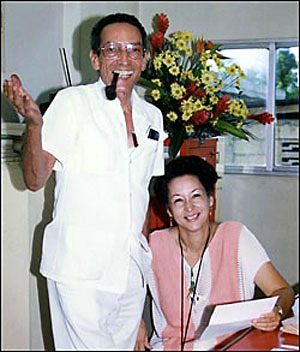
The Human Rights Archive at Duke University’s Rubenstein Library and the estate of broadcaster Jean Dominique have announced a partnership to preserve the broadcast archives of the journalist’s iconic Radio Haiti station. From the 1960s to 2002, Radio Haiti was that country’s first independent radio station, promoting democratic freedoms, speaking out against human rights abuses, and celebrating Haitian life and culture. The station’s archive includes approximately 2,500 audio recordings of programs, as well as 28 boxes of paper records. Recordings include daily coverage of events, cultural programs, interviews on public affairs, political analysis, and roundtable discussions on different aspects of Haiti’s recent history.
“The Radio Haiti collection is an incredibly important resource for understanding the recent history of Haiti,” said Laurent Dubois, Marcello Lotti Professor of Romance Studies and History at Duke. “Because the station broadcast news and reportage largely in Creole and extensively covered events both in Port-au-Prince and the rural areas of Haiti, the collection gives us unequalled access to an understanding of one of the most important grassroots democratic movements in recent history: the movement that overthrew the Duvalier dictatorship in 1986.”
The Radio Haiti archives were donated to the Rubenstein Library by Michèle Montas, station co-anchor and widow of Jean Dominique. Dominique had an unquenchable passion for Haiti and its people, and his quest for truth and justice may have led to his assassination in 2000.
According to Montas the archives “capture a time and place in which journalists and broadcast journalism played a major role in redefining a country and reaching a people. Beyond Haiti, they bear witness to the turbulent transition from a dictatorship to a functioning democracy. ”
Montas stressed that the archives matter today because they touch on and track issues that remain of paramount importance in Haitian society. “By saving these archives and making them once more accessible to large audiences, Duke and the Rubenstein Library are playing a crucial role in advancing the dialogue about Haiti and its future.”
On April 3, Montas will be at Duke to discuss the history of Radio Haiti and its archive. Archivists from the Rubenstein Library will also share some of the challenges of preserving such a large audio collection and discuss the importance this archive has for the broader Haitian community and the human rights movement. Those interested in learning more about preserving Radio Haiti can visit Duke Library’s Youtube channel. The event is free and open to the public and will be held at 12 p.m. in the Forum for Scholars and Publics, Old Chemistry Building Room 011, on Duke’s West Campus. Lunch will be provided.
The Radio Haiti archives join other recent acquisitions by the Rubenstein Library documenting the history of Haiti, including the records of the National Coalition for Haitian Rights, the Mark Danner Papers, and a scribal copy of the Haitian Declaration of Independence dating from 1804.
The Radio Haiti archives will open for research after conservation review and archival processing are complete. For more information, contact Patrick Stawski, Human Rights Archivist.



Michèle, chère soeur, après que Jean Dominique ait perdu sa vie et toi, un amour, au nom de la démocratie en Haiti. Il m’est peiné de lire ce qui suit : ” The Radio Haiti archives were donated to the Rubenstein Library by Michèle Montas, station co-anchor and widow of Jean Dominique “. Pareille richesse, d’un pays démuni, livrée en don a l’un des pays les plus riches au monde…….Ahahah, mais ” Haiti, ou von nou “. Ces pauvres nègres, d’Haiti, : ” Ils n’auront donc rien “, Sonthonax eut raison., il fut aussi JOURNALISTE. Merci !